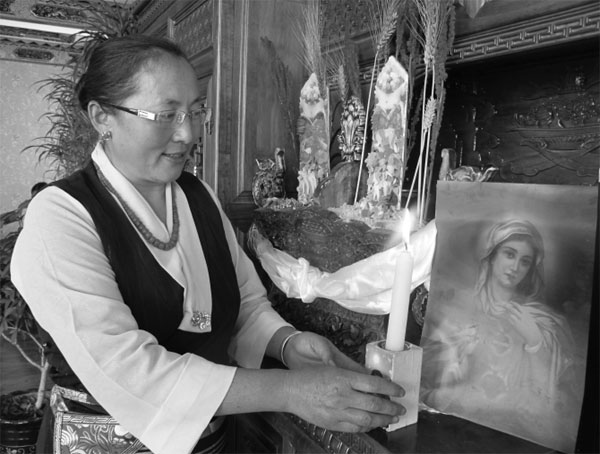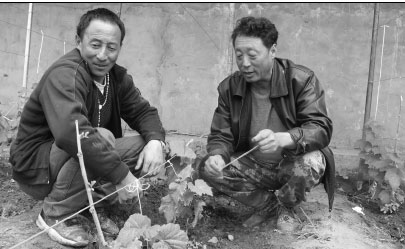Practicing Catholics engage in viticulture as part of their religious beliefs
One of the first objects to catch your eye when you enter Hua Sheng's living room is a statue of Jesus wearing a traditional Tibetan white scarf called a khadak.
Nearby, a goblet of red wine and cups of sweet and black tea glitter in the morning sunshine - three drinks reflecting three different cultures.
When most people think of religion in the Tibet autonomous region, Buddhism and Bon come to mind, but Hua and his wife Lu Sheng are descendants of the few here who identify themselves as Catholics.
For centuries, Tibetans who follow Buddhism, Bon, Islam, and Catholicism have been living harmoniously together from one generation to the next.
"Tibet is a place with various beliefs and ethnic groups. I think the lord Jesus wearing a white khadak is only seen in Tibet," said Lu, smiling.
Hua and Lu live in Tsakhalo, Markham county, which is famed for its natural salt flats.
Unlike many Tibetans, who spend their time after retirement practicing their religion or leisurely enjoying their twilight years, the couple are working on their new dream of planting a vineyard.
In Christian theology red wine represents the blood of Jesus, and many Catholics yearn to be able to make their own wine.
It is thought grape-growing skills were transmitted to Tibetan Catholic nuns in the mid-18th century by French priests.
"Planting grapes and making wine are age-old traditions for us Catholics, and I have loved it since a young age," said Lu, 54.
After planting the grapevines a year ago, the couple are hopeful that they will bear fruit within three years.
"We have one fixed member of staff who manages the land and we hire Tibetan farmers to do the planting on a temporary basis," said Hua, 53.
Lu, whose name is a Chinese transliteration of Lucy, said all her ancestors were Catholics, who migrated to Lhasa more than three decades ago.
"My grandmother was a nun who planted grapes all her lifetime, and I want to follow in her footsteps," she said.
It's not just the couple who are engaged in grape growing, their son Li Yongsheng has also quit his job in civil aviation vehicle maintenance to assist his parents. The 25-year-old quit his job in Xigaze Airport a year ago, as he believes it is crucial to help his parents fulfill their dreams.
His mother is no stranger to viticulture, as a great grapevine more than a decade old grows in the family's yard, which Lu harvests to make wine that she shares with her friends and neighbors.
"We have been friends for almost nine years. She always helps me, and has never gotten angry with me," said Lhamotso, a 38-year-old shop owner.
Lu's hometown is in the southeastern part of the autonomous region, on the Ancient Tea Horse Road. It stands at a cultural intersection between Sichuan province and Tibet.
Historical documents indicate that Catholic missionaries arrived in this area in the 18th century, which was when the first and only Catholic church was founded in Tibet.
"We are very confident of producing a natural and healthy red wine after three years," Lu said.

Lu Sheng places a votive candle in front of an image of Mary at a shrine in her home in Lhasa, Tibet autonomous region. [Photo/China Daily]

Hua Sheng (right) works in his vineyard greenhouse in Lhasa with his brother-in-law. [Photo/China Daily]